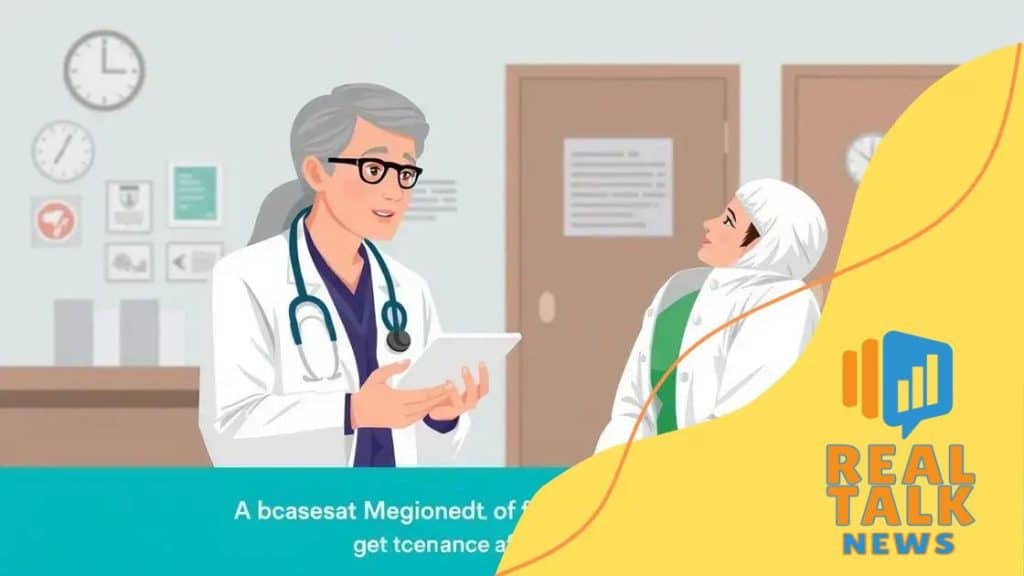The future of Medicaid expansion under new legislation

The future of Medicaid expansion under new legislation promises increased healthcare access and better health outcomes for low-income families, despite facing challenges like political resistance and administrative barriers.
The future of Medicaid expansion under new legislation is a topic that sparks interest and concern among many. With significant changes on the horizon, how will this impact coverage and access for those who rely on it?
Understanding Medicaid expansion
Understanding Medicaid expansion is vital for grasping the shifting landscape of healthcare in the United States. This initiative aims to increase access to healthcare for millions of low-income individuals and families.
What is Medicaid Expansion?
Medicaid expansion refers to a provision under the Affordable Care Act (ACA) that allows states to expand their Medicaid programs to include more residents. This expansion offers enrollment to people earning up to 138% of the federal poverty level.
Benefits of Medicaid Expansion
Expanding Medicaid comes with numerous benefits:
- Increased access to healthcare services
- Improved health outcomes for enrollees
- Financial relief for families
- Strengthened state economies through federal funding
Many states have adopted this expansion, resulting in a significant increase in uninsured individuals gaining coverage. States that have expanded Medicaid often report better health outcomes and lower hospital readmission rates.
Moreover, expanding Medicaid can reduce the burden on emergency rooms as more people receive preventive care. This shift results in healthier populations and a decrease in overall healthcare costs.
Who Benefits?
The primary beneficiaries of Medicaid expansion are low-income adults who previously did not qualify for Medicaid. This includes low-wage workers, parents, and people with chronic illnesses. Additionally, those who are homeless or have substance use disorders also find critical support through enhanced access to services.
As more individuals enroll, the ripple effect on communities is profound. Families can access essential health services without the fear of crippling medical bills. This helps to alleviate financial stress and improve mental well-being.
In conclusion, understanding Medicaid expansion reveals its potential to transform healthcare accessibility for underserved populations. By providing essential health coverage, it not only enhances individual health outcomes but also strengthens community health overall.
Key changes in recent legislation
Key changes in recent legislation regarding Medicaid expansion have reshaped the healthcare landscape, making it easier for millions to access necessary services. These changes are a response to ongoing challenges in providing affordable healthcare to low-income populations.
Expansion of Eligibility
One of the most significant changes is the expansion of eligibility criteria. States can now allow individuals earning up to 138% of the federal poverty level to qualify for Medicaid. This provision aims to cover more low-income adults who previously fell through the cracks.
Increased Federal Funding
Recent legislation has also increased federal funding for states that choose to expand their Medicaid programs. This financial boost helps states cover the costs of newly eligible beneficiaries. Enhanced funding means that many states will not have to stretch their budgets to accommodate this expansion, making it a more attractive option.
- Federal government covers a higher percentage of the costs for new enrollees.
- States receive incentives to adopt expansion.
- Funding helps improve healthcare infrastructure.
- Promotes preventive care over emergency care.
Another key change includes the focus on improving healthcare outcomes through quality measures. New legislative measures encourage states to implement programs aimed at elevating care quality. This includes better management of chronic diseases and access to mental health services, which are crucial for overall well-being.
Furthermore, with these legislative updates, there are mandates for promoting health equity. States are now encouraged to implement strategies that address disparities in health access and outcomes among different populations. Creating equitable healthcare systems is essential for fostering healthier communities.
Telehealth and Accessibility
Lastly, recent legislation has expanded the use of telehealth services under Medicaid. This change is particularly important in rural areas where access to healthcare providers is limited. Telehealth allows patients to consult with healthcare professionals from their homes, increasing accessibility and convenience.
With these key legislative changes, Medicaid expansion not only aims to provide coverage but also focuses on enhancing the overall healthcare experience for all beneficiaries. As states adapt to these updates, the future of healthcare accessibility looks brighter for many individuals and families in need.
Potential benefits for low-income families

Potential benefits for low-income families through Medicaid expansion are significant and wide-ranging. This initiative provides crucial healthcare access to families who may otherwise struggle to afford necessary medical services.
Access to Essential Health Services
One of the primary benefits includes increased access to essential health services. Low-income families can receive preventive care, routine check-ups, and necessary treatments without the burden of high costs. This access is critical for maintaining overall health and preventing serious conditions from developing.
Financial Protection
Medicaid expansion also offers financial protection to families. By covering their healthcare costs, families can avoid the stress of overwhelming medical bills that can lead to debt. Families are more likely to seek care without fearing the financial impact, creating a healthier environment.
- Reduction in out-of-pocket expenses.
- Elimination of unpaid medical debt.
- Increased household stability.
- Improvement in overall financial health.
Moreover, families enrolled in Medicaid often experience better health outcomes. With access to healthcare, children can receive vaccinations and screenings vital for early detection of health issues. Healthy children are better prepared for school, leading to improved educational outcomes.
Additionally, expanded access to mental health services is another critical advantage. Many low-income families face stress and challenges that can affect mental well-being. Medicaid expansion provides these families with access to counseling and mental health resources, helping them manage these challenges effectively.
Support for Pregnant Women and Newborns
Women who are pregnant or planning to become pregnant benefit significantly from Medicaid expansion. They gain access to prenatal and postnatal care, which is vital for the health of both the mother and the baby. This care can lead to healthier pregnancies and better long-term outcomes for children.
In summary, the potential benefits for low-income families under Medicaid expansion highlight the importance of accessible healthcare. As states adopt this initiative, many families can look forward to a healthier and more secure future.
Challenges in implementing the expansion
Challenges in implementing Medicaid expansion present significant hurdles for many states. Despite the benefits, states face various obstacles that can hinder their ability to fully adopt this initiative.
Political Resistance
Political resistance is one of the most prominent challenges. Some lawmakers oppose Medicaid expansion due to concerns about state budgets and long-term costs. This resistance can stall or completely halt legislative efforts necessary for expansion.
Administrative and Operational Barriers
Another challenge involves administrative and operational barriers. States need to revamp their systems to process new applications and manage increased enrollment effectively. This requires time and resources, which some states may lack.
- Staff training to handle new processes.
- Updating technology for tracking enrollments.
- Ensuring compliance with federal regulations.
- Coordinating services with healthcare providers.
Additionally, states may encounter difficulties in outreach. Many low-income individuals may not be aware of their eligibility for Medicaid or may face challenges in enrolling. Effective outreach is critical to ensuring that those who need coverage can access it without barriers.
Furthermore, concerns about the quality of care in the expanded Medicaid programs can arise. Some stakeholders worry that adding more patients may overburden healthcare facilities, leading to longer wait times and decreased quality of care. This makes it necessary for states to thoughtfully plan and allocate resources to manage the volume of new enrollees effectively.
Fiscal Concerns
Fiscal concerns also play a significant role. States are worried about the potential financial impact of Medicaid expansion on their budgets. While the federal government provides matching funds, some states fear they may face increased costs over time as federal funding decreases. This apprehension can deter states from proceeding with the expansion.
In summary, while the potential advantages of Medicaid expansion are significant, addressing the challenges in implementing these changes remains essential. By overcoming political, administrative, and fiscal barriers, states can create a pathway to increased healthcare access for many individuals in need.
Future implications for healthcare systems
The future implications for healthcare systems as a result of Medicaid expansion are significant and multifaceted. As more states adopt this expansion, we can expect transformative changes in how healthcare is delivered and accessed across the country.
Increased Patient Volume
One major implication is the increased patient volume in healthcare facilities. With more individuals gaining access to insurance coverage, hospitals and clinics will likely see a rise in patient numbers. This can lead to a need for more healthcare providers and resources to meet the growing demand. Facilities will have to adapt by hiring additional staff and possibly expanding their services to accommodate everyone.
Impact on Healthcare Cost
Medicaid expansion may also impact overall healthcare costs. It promotes preventive care, which can reduce the need for expensive emergency services. By increasing access to regular check-ups and screenings, healthcare systems can potentially lower long-term costs associated with untreated conditions.
- Reduced hospital readmissions due to better preventative care.
- Lower costs for emergency services by alleviating overcrowding.
- Improved management of chronic diseases.
- Potential decrease in uncompensated care costs for providers.
Moreover, the effects of Medicaid expansion on public health could reshape the healthcare landscape. As more people receive necessary medical attention, we may see improved health outcomes across various demographics. This improvement could lead to a healthier workforce, reducing absenteeism and increasing productivity.
Another future implication involves the integration of services. States that expand Medicaid may also find it necessary to integrate physical and mental health services. This will ensure that individuals receive comprehensive care that addresses both their physical and mental health needs, fostering overall wellness.
Healthcare Accessibility
Healthcare accessibility will also be transformed. With Medicaid expansion, barriers that previously prevented low-income individuals from receiving care will diminish. This shift can fundamentally change the accessibility landscape, making healthcare more equitable.
In summary, the future implications for healthcare systems as a result of Medicaid expansion are vast. From increased patient volumes to enhanced healthcare accessibility, these changes hold the promise of improved health outcomes and stronger healthcare systems overall.
FAQ – Frequently Asked Questions about Medicaid Expansion
What is Medicaid expansion?
Medicaid expansion is a provision under the Affordable Care Act that allows states to expand their Medicaid programs to cover more low-income individuals.
What are the main benefits of Medicaid expansion?
The main benefits include increased access to healthcare services, financial protection for families, and improved health outcomes for low-income individuals.
What challenges do states face in implementing Medicaid expansion?
States face challenges such as political resistance, administrative barriers, and concerns about the long-term financial impact on their budgets.
How does Medicaid expansion impact healthcare costs?
Medicaid expansion can lower overall healthcare costs by promoting preventive care, reducing the need for emergency services, and managing chronic conditions more effectively.





